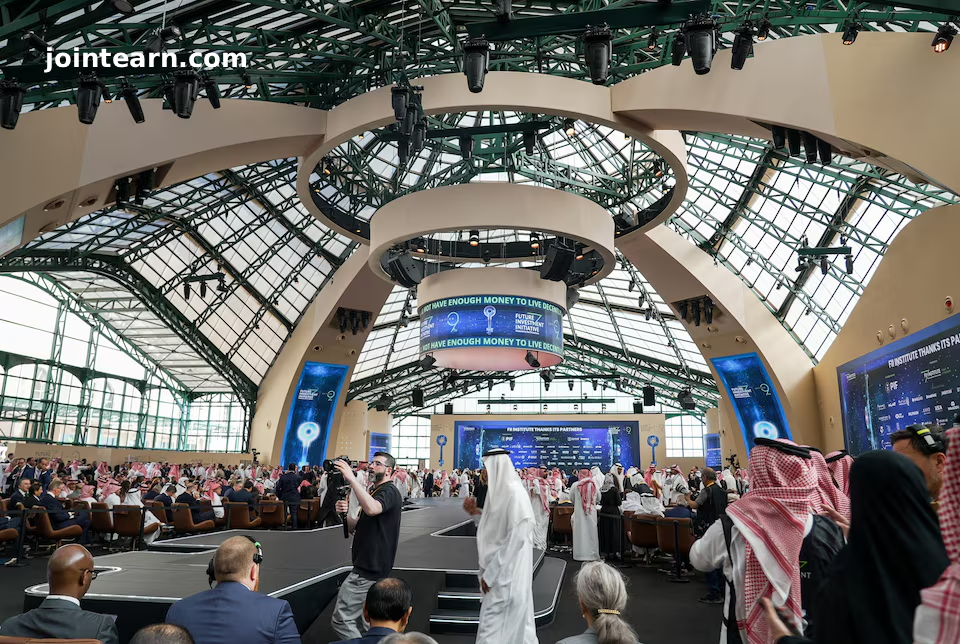
Saudi Arabia is set to restructure the strategy of its $925 billion sovereign wealth fund, shifting attention away from massive real estate megaprojects that have defined the kingdom’s development vision for nearly a decade. The new direction will prioritize logistics, mining, artificial intelligence (AI), and religious tourism, according to a source familiar with the matter.
The move comes as Crown Prince Mohammed bin Salman (MbS), the kingdom’s de facto ruler, seeks to ensure more sustainable short-term returns from the Public Investment Fund (PIF) — the financial backbone of his ambitious Vision 2030 economic diversification program.
From Gigaprojects to Growth Sectors
Launched in 2016, Vision 2030 aimed to transform Saudi Arabia’s oil-dependent economy through sweeping investments in futuristic cities, tourism, and infrastructure. The PIF was central to this strategy, funding multibillion-dollar developments such as NEOM, The Line, and the Red Sea Global luxury tourism destination.
However, several of these megaprojects have suffered cost overruns and repeated delays, leading to mounting concerns over returns on investment.
“The new strategy narrows PIF’s focus toward logistics, mineral exploration, and technology,” said a source with direct knowledge of the plan. “It’s about creating near-term profitability and ensuring capital is allocated efficiently.”
The PIF’s updated five-year strategy, expected to be unveiled within weeks, will mark a significant pivot from high-risk, capital-intensive projects to sectors with faster, more stable returns.
NEOM and Other Projects Face Delays
Among the most high-profile developments under scrutiny is NEOM, a futuristic smart city on the Red Sea expected to house nine million residents. Originally envisioned as a sprawling urban and tourism hub featuring floating industrial zones and ski resorts, NEOM has encountered multiple delays.
Work on “The Line”, NEOM’s flagship linear city concept stretching 170 kilometers, has reportedly been scaled back to prioritize a 2.4-kilometer segment that includes a stadium intended for the 2034 World Cup.
Other high-profile projects, including Trojena, slated to host the 2029 Asian Winter Games, may also face postponement to 2033, according to insiders.
A New Economic Focus
PIF’s revised investment approach emphasizes logistics, rare earth minerals, and digital infrastructure — key areas aligned with Saudi Arabia’s long-term ambition to become a global logistics and technology hub.
The Red Sea shipping disruptions earlier this year have underscored the need for resilient regional supply chains, prompting PIF to invest heavily in transportation infrastructure, ports, and freight corridors.
The kingdom also plans to tap into undisclosed reserves of rare earth minerals, a sector seen as crucial for diversifying export revenues and supporting global energy transition industries.
Artificial Intelligence and Data Infrastructure
Artificial intelligence has emerged as a top national priority. At the Future Investment Initiative (FII) forum in Riyadh this week, AI dominated discussions, with PIF-owned Humain unveiling plans to develop 6 gigawatts of data center capacity powered by Saudi Arabia’s abundant energy resources.
“Let’s just put it this way — everything we ask for, we get,” said Tareq Amin, CEO of Humain, highlighting the kingdom’s aggressive funding push for AI-driven innovation.
The PIF’s AI focus is part of a broader effort to establish Saudi Arabia as a regional technology leader, complementing its ongoing investments in energy, petrochemicals, and renewable power generation.
Financial Performance and Investment Rebalancing
Despite its immense portfolio, the PIF has faced increasing pressure to deliver stronger returns. Between 2017 and 2024, the fund recorded an average annual return of 7.2%, down from 8.7% in 2023, partly due to impairments on delayed projects.
In response, the PIF board recently approved a new “core strategy,” focusing on profitable domestic sectors and reducing exposure to international holdings.
Last year, PIF Governor Yasir Al-Rumayyan announced plans to cut international investments from 30% to 18–20% of the fund’s portfolio, citing the need to prioritize domestic growth opportunities.
Boosting Religious Tourism and Cultural Projects
In addition to economic diversification, the PIF’s updated plan reinforces investments in religious tourism, particularly in Mecca and Medina, as the kingdom aims to host hundreds of millions of pilgrims annually.
Earlier this month, Crown Prince Mohammed bin Salman unveiled a major expansion at Mecca’s Grand Mosque, adding nearly 900,000 new praying spaces to accommodate growing visitor numbers.
Outlook: A Strategic Reset for Vision 2030
The shift in PIF’s focus marks a strategic recalibration of Vision 2030 — one that emphasizes sustainable profitability and technological leadership over symbolic mega-projects.
While Saudi Arabia remains committed to landmark initiatives like NEOM and the Red Sea Global resort, analysts believe the coming years will see greater discipline in investment decisions and a stronger emphasis on deliverable outcomes.
At the same time, the kingdom continues to expand in gaming, AI, and logistics, while leveraging its energy wealth to power industrial innovation and digital transformation.
As Vision 2030 approaches its mid-point, the reorientation of the Public Investment Fund signals Saudi Arabia’s pragmatic shift from ambition to execution — from building futuristic skylines to building the financial foundations for long-term resilience.


Leave a Reply